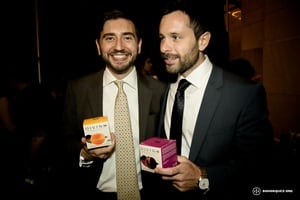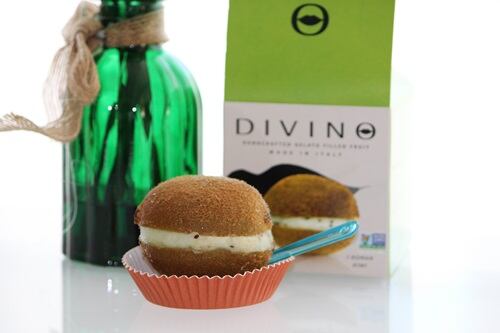“I get a lot of people asking ‘Did you trademark this? Why don’t you trademark this?’ and I say It’s not trademarkable, it’s been around forever and it’s a simple thing!” Divino co-founder Cataldo told FoodNavigator-USA. “I saw it in Italy and I just couldn’t believe it wasn’t here in the United States.”
Its stateside reception has been warm, Cataldo said. It was sold in 1000 stores just 6 months after being introduced at the Fancy Food Show in 2014, and last fall it was mentioned as one of Oprah’s favorite things.
This year, Cataldo is traveling the world to introduce Divino to even more markets—the brand’s Expo West debut two weeks ago was sandwiched between shows in the United Arab Emirates and Japan.
It’s the volcanoes
“[Divino] hits all the trends people are looking for—low calorie, fat-free, vegan, non-GMO, gluten-free. And its fruit so it’s a healthy single-serve, frozen novelty,” Cataldo said.

But one popular checklist item the product can’t cross off is “locally sourced,” for U.S. buyers at least. According to Cataldo, having only five to six ingredients means it’s very important to get the best versions of them, especially for the product’s spotlight ingredient: fruit. And for the Divino team, best meant Italy.
“I really think the differentiator for this is the water,” he said. “The particular region where our facility is [located] is Mount Vesuvius, and I think the volcanic soil heightens flavor.”
Boasting a “Made in Italy” claim on its minimalistic box, fruits are all sourced in Italy. In fact, the exact region where the fruit is grown is explained on the boxes, and for some items, in the name of the product (Ciaculli Tangerine, Amalfi Lemon, and Apulian Peach).
The assembly line in Campania handcrafts each product. “We have basically an entire community, family, friends of family,” Cataldo said. “The process is really cool, the fruit is cut in half by hand, the pulp put in a gelato machine, and then the gelato is scooped into the fruit.”
The fruttini are then freeze blasted, packaged, and shipped off to the US, where it can now be found in all 50 states. For a suggested retail price of $3.99, Divino can be bought at natural and specialty stores, as well as conventional supermarkets such as Safeway and Mariano’s.
A global audience
Cataldo said Divino has been targeted towards young to middle-aged women, which affected the way the team designed the packaging and overall branding.

“But we’ve seen a huge traction with kids. We’ve done events with children’s [organizations] promoting healthy eating,” Cataldo added.
In terms of geographic reach, the team is planning international expansion. Funny enough, the birthplace of fruttini is further down the agenda. “Italy is a different market. The consumer habit is different,” Cataldo said.
“Why did we go to the shows in Dubai, the United States, and Japan? That’s because they’re consumer driven by consumer markets. Grocery trips are different—in Italy your groceries can fit in one bag instead of the back of your SUV,” he said, comparing it to the average American, Emirati, or Japanese grocery trip.
“But we’re doing shows in France and Germany, and we developed the product and branding based on universal things,” Cataldo added. “Our logo is lips, representing a kiss, and it also happens to look like the fruit. It’s a universal symbol of happiness.”
